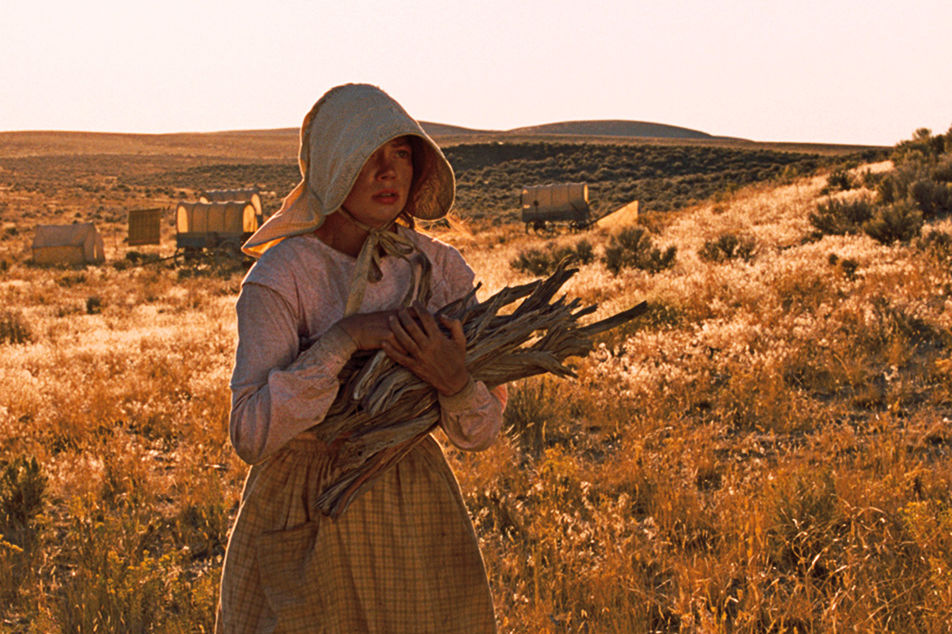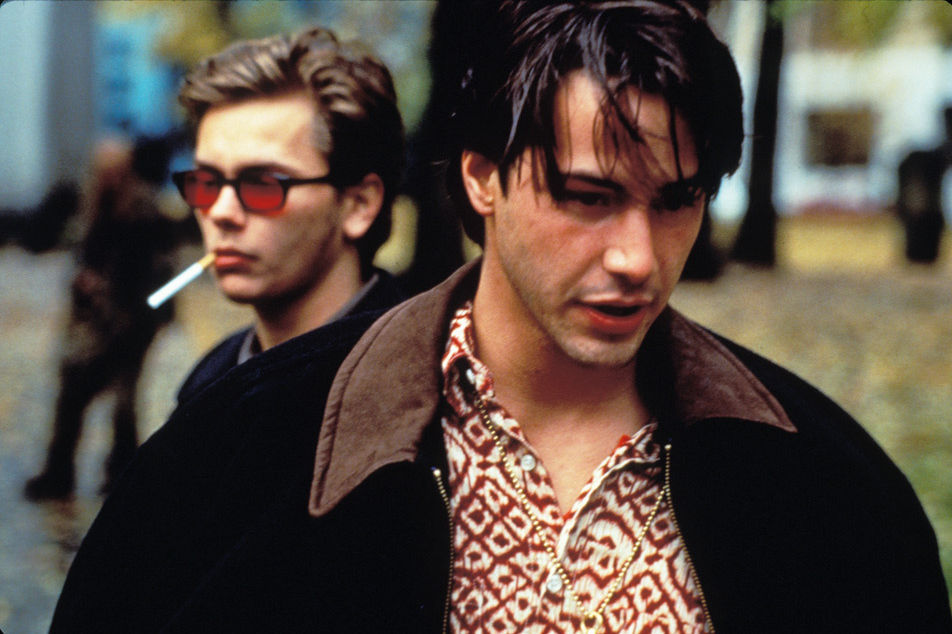Pig Is a Wildly Original Journey to the Center of Portland’s Food Scene
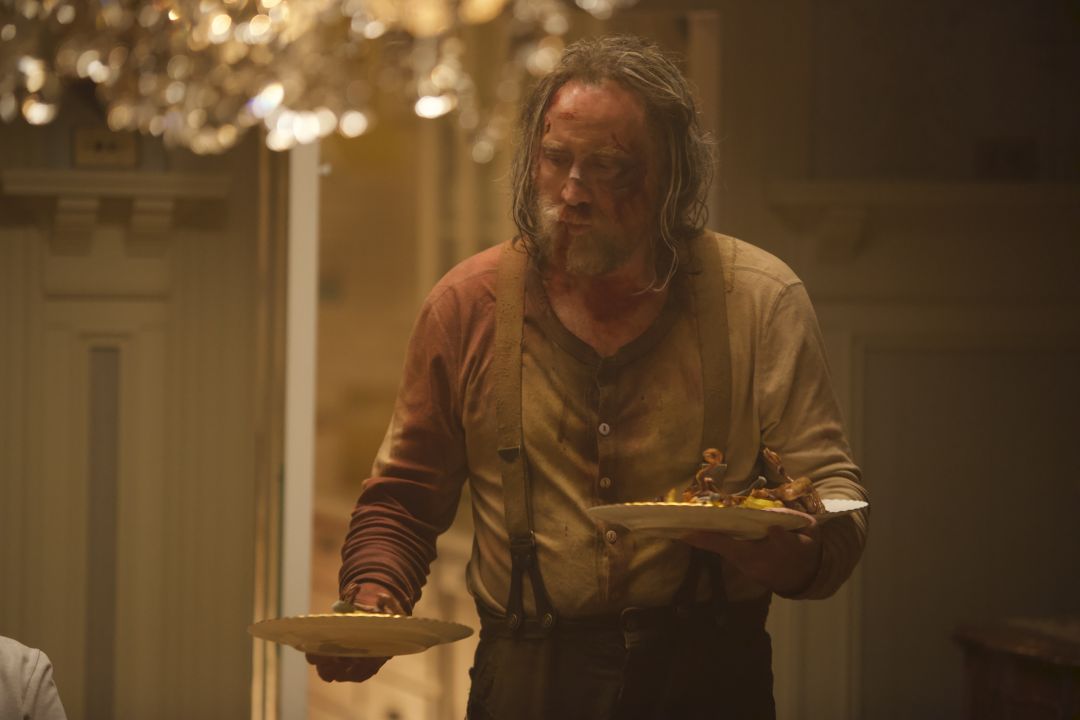
Revenge, in Pig, is a dish best served gently.
Image: Courtesy Neon
I don’t think there’s ever been a movie like Pig before. I’m young and stupid, so if you disagree, feel free to dig through my Letterboxd, screenshot my 4.5/5-star review of Josie & The Pussycats, and put me on blast on the platform of your choosing. But I think I’m right.
Michael Sarnoski’s quietly operatic black-comic noir could, by turns, be described as a takedown of Portland’s navel-gazey culinary scene, a surreal journey through crisscrossing streams of grief, or a movie where a blood-soaked Nicolas Cage says, “I don’t fuck my pig.” There are strands of First Cow in its use of food to say something about Oregon’s social strata, of Eyes Wide Shut in its protagonist who snakes through a dream city in pursuit of an impossible goal, of Fight Club in its subplot about a fight club. In act three, we even get a healthy dash of Ratatouille.
But in the way it arranges these ingredients, and the ends to which it applies them, Pig is a true original.
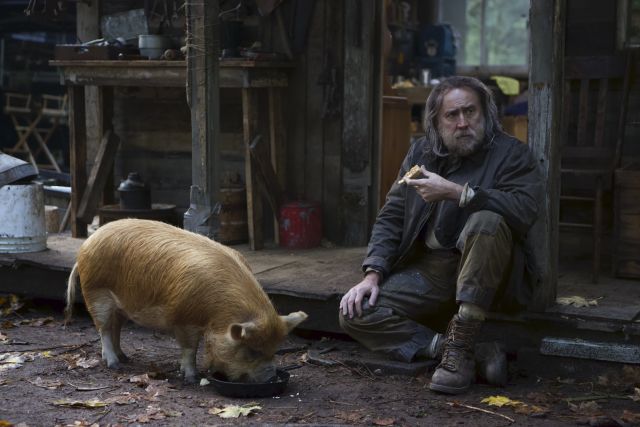
Nicolas Cage and his pig in Pig
Image: Courtesy Neon
The film opens with a glimpse of what might be Eden. Robin "Rob" Feld (Cage) shares a cabin in the Oregon wilderness with his beloved companion, a nameless, adorable orange pig. The two spend their days pulling truffles for Amir (Hereditary's Alex Wolff)—a boyish Portlander with an ill-fitting Camaro—and their nights idling by the fire. It looks like a happy enough existence, but Sarnoski gives it the foreboding of a Grimm fairy tale: the landscape can get oppressively gray; here and there, Rob fondles and then turns away from artifacts of a past life.
One night, thieves knock Rob unconscious, drag his pig away, and set the movie in motion. With his livelihood threatened, Amir drives Rob into Portland (referred to as “the city” with hilarious frequency), where Rob leverages his past as a legendary chef to retrieve his porky life partner. The journey takes the two underneath Pioneer Courthouse Square, over the Broadway Bridge, to the gilded mansions of the West Hills, and briefly, to Huber’s.
They bribe butchers, visit mausoleums, and eat deconstructed scallops on huckleberry foam. All the while, one gets the sense that Rob's mission is about more than just his pig. One is only kind of right.
Sarnoski’s screenplay skips from tone to tone and genre to genre with gleeful abandon, never for a second going right where you think it will. Grounding things, though, is a deep melancholy—in Pig, there are laughs and gasps and blood splatters, but mostly, there’s sadness. The movie nails Portland the way Kelly Reichardt and Andrew Haigh have, by hewing closer to My Own Private Idaho than Shrill or Portlandia: the city feels dangerous, sleepy, and opaque at once. It’s a place whose import has outpaced its means, full of too-empty neon alleyways and hustlers of all stripes fending off the fact that an overdue earthquake will sweep them all underwater soon enough.
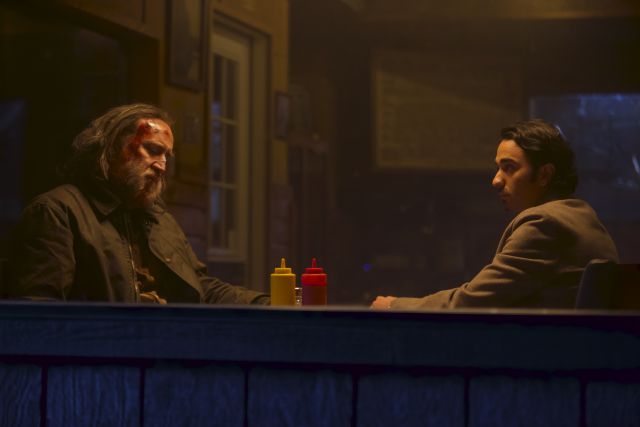
Alex Wolff's Amir (right) accompanies Nicolas Cage's Robin Feld (left) on his dark night of the soul in Michael Sarnoski's Pig
Image: Courtesy Neon
In a virtuosic midpoint monologue, Cage says as much. He’s onscreen for most of Pig’s tight 90 minutes, but it’s a primarily physical performance, one in which he hardly says more than "Where's my pig?" Over breakfast with Amir, though (all the film’s emotional turning points take place at mealtime), Rob tries to minimize their suffering by laying out the mechanics of the Big One, stuttering as he catalogs the future devastation, and then capping it off with the line, “Anyway, you should use stale bread for French toast.” It's hilarious and heartbreaking, and it gets right to the gut of the twin splendor and paranoia that characterize life in the Northwest.
Not everything works so well. Sarnoski is overly determined to draw clean, broad motivations for his characters, and the movie he’s made doesn’t always need or support them. Some dialogue, as a result, winds up a little too on-the-snout, and title cards that divide the film into three courses are too cute by half. A balls-to-the-wall denouement lays the syrup on a little thick, and I'm not convinced it satisfyingly addresses all the questions Sarnoski poses.
Still, beat by surprising beat, you find yourself stunned that something whose logline should be "pig John Wick" could wind up so gentle and moving. For all its theoretical bombast, Pig is a small movie about what we gain and what we lose by choosing to live in the real world, beside its ugliness and beauty. It respects our desire for fantasy as it nudges us gently toward the truth. It gives us a scene where a murderous truffle tycoon is moved to tears by a well-prepared game hen and a bottle of pinot.
That’ll do, Pig. That’ll more than do.
Pig is now playing at the Fox Tower, Cinema 21, and Century 16 Eastport Plaza

